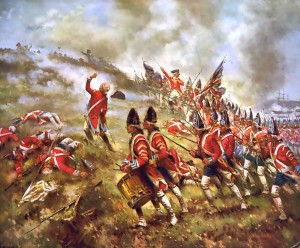Colonies and Revolutions
(24) Mayflower Compact and the Landing of the Pilgrims (1620) – The Pilgrims were Puritan separatists, who were seeking a place they could practice their religion as they wished. They had set out for Virginia, but ended up much farther North at Plymouth. The Mayflower compact was their first draft of a Government founded on their Puritan principles and morality, but still under the English King (though not the church of England). Their settlement barely survived that first winter, but it was their celebration of the following harvest that we now celebrate as Thanksgiving.
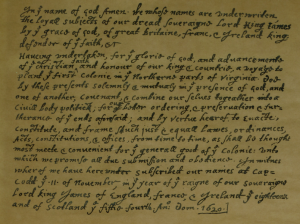
(25) Founding of the Massachusetts Bay Colony (1628) – Unlike the Pilgrims who founded Plymouth, the Founders of the Massachusetts Bay Colony were not separatists. They were seeking a place to follow more closely the practices they found in the new Testament, including the ideal rules of Government. They saw the colonies as a place they could seek to establish that new form of government without too much interference from England. The colonies ended up becoming a haven for Puritans as Archbishop Laud persecuted them in England.
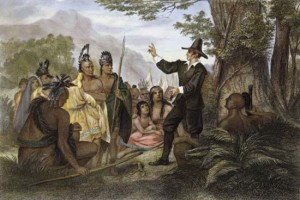
(26) Roger Williams Founds Rhode Island on Religious Freedom (1636) – Despite the Massachusetts Bay Colony’s desire to separate themselves from the influence of the English Government and to escape the persecution of the Puritans in England, the colony still enforced a particular religion upon the people. Roger Williams eventually founded the colony of Rhode Island in Providence based upon the ideas that “freedom is required as part of the very obligation to worship God. Worship must be sincere and all efforts to force it actually weaken it.” Williams believed there must be a clear separation of church and state in order to allow the proper worship of God and practice of religion. Eventually the church he founded became Baptist.
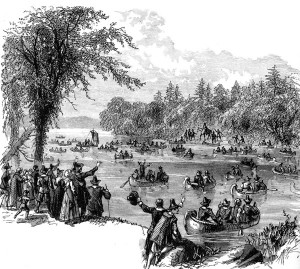
(27) Long Parliament Convened (1640) – In England, King Charles I was having difficulty in raising funds to fight against the Scottish rebels in the North so assembled what eventually became known as the Long Parliament. Instead of following his wishes, the Parliament declared that it could not be dissolved by the King without its own agreement. Then it began investigating the persecution of Puritans by the King’s men. This eventually lead to a civil war in England between parliament and the king. Both Charles and his Archbishop Laud (who had been so ardent in his persecution of the Puritans) were captured and executed. While it pursued war against the crown and justice against persecutors, parliament also took on the reformation and the ‘purification’ of the Church of England.
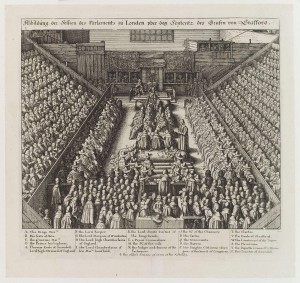
(28) Publication of Meditations on First Philosophy (1641) – No modern History of the Church could be complete without addressing the work of Descartes. In 1641, the work he is most widely known for was published, Meditations on First Philosophy. It was originally intended to answer the skeptics and critics who had claimed that the new reason and rationalism had rendered the need for God obsolete. Instead he ended up solidifying the skepticism of the time and his ideas (called cartesianism) promulgated the idea of universal doubt and the idea of separation of the soul and the body. His statement “I think therefore I am” is still giving undergraduate philosophy students (and graduate Theology Professors) much to write about today.

(29) Solemn League and Covenant (1643) – When the Long Parliament was at war with the King, Irish Catholic troops were joining the King’s royalist forces. Parliament sought an alliance with the Scottish rebels . The Scots promised to aid Parliament on the condition that the Scottish form of Church Government (Presbyterianism) was adopted in England. While this document as a treaty would not hold the alliance for very long, it began changes in the Church of England that would affect the Westminster confession later released by parliament. It virtually assured that the form of government espoused in the Westminster Confession would be Presbyterianism.
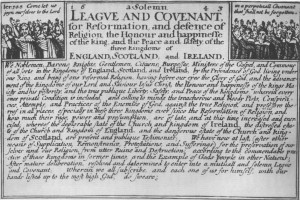
(30) Westminster Confession Published (1646) – Parliament convened an assembly to restructure the church of England. Representatives from both England and Scotland participated in the development of a creedal confession (the Westminster Confession of Faith, WCF) and associated catechisms (larger and shorter). Though these documents were rejected when the Monarchy was restored in 1660, the Scottish church, the Presbyterian Churches around the world and many other denominations still use the Confession as their creedal statement, often requiring some level of subscription to its statements for their pastors. The confession presents statements similar to the Synod of Dort, but is more comprehensive in its coverage, including issues primarily relevant to the current time in England.
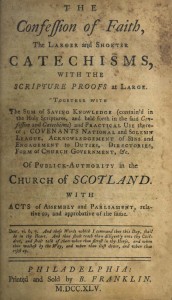
(31) Peace of Westphalia (1648) – After the death of Ferdinand II in 1637, a long and complicated negotiation began that resulted in the Peace of Westphalia, ending the Thirty Year’s War. Sweden and France were granted large portions of Land, and the power of the German Princes were increased with respect to the Holy Roman Emperor in order to balance the Emperor’s influence. All people were then allowed to follow their religion (as long as they were Catholic, Lutheran or Reformed). But the war also led to the founding of the modern state that ignored religion in order to prevent the sort of bloodshed that resulted from it during the Thirty Years War.
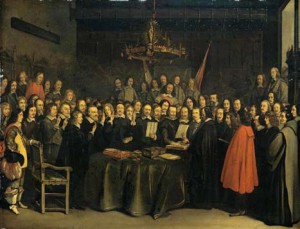
(32) Spener begins “colleges of Piety” (1670) – Jakob Spener has been called the father of Pietism, though the roots of Pietism precede Spener. Pietism was a “response to the dogmatism of the theologians and the rationalism of the philosophers” and the Thirty Years War, and it emphasizes the living faith that is at the heart of Christianity and demonstrated in a holy life and works. As a Pastor in Frankfort, he began groups of Bible study and devotion that he called colleges of piety and devotion. In his book about these groups, Pia Desideria, he emphasized the need for the laity to be devoted to study of the scriptures and to go beyond the dogma into a personal obedience to the scriptures. It was the pietist followers of Spener who first began to send protestant missionaries out to foreign lands.
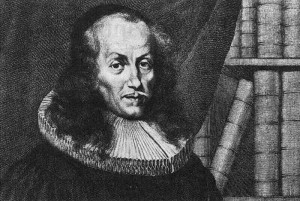
(33) The Great Awakening (c. 1734-1742) – The Pietism movement eventually reached the shores of England and especially America causing a revival movement called the Great Awakening. Many of the leaders of the Great Awakening were orthodox Calvinist who underscored the need for an experience of conviction of sin and divine forgiveness. Through the preaching of Jonathon Edwards, and then George Whitefield, and Wesley in England (and occasionally in America) thousands were converted and many churches were renewed in spirit. While the movement was begun by the Congregationalists and Presbyterians, it spread to the Baptists and Methodists who took t to the frontier where those denominations became most numerous.
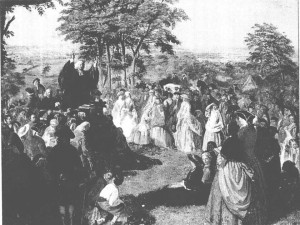
(34) John Wesley meets the Pietists (1735) – One of the most important Pietists in terms of impact upon the later church was John Wesley. He had grown up in England, the son of an Anglican priest, and he had studied at Oxford where his brother had founded a religious society that came to be known as the ‘Holy Club.’ Wesley met a group of Moravians (a Pietist group) on his way to Georgia to take up a preaching position and their faith had greatly moved him. When he returned to England after failing at his preaching position in Georgia he sought out the Moravians. Peter Boehler became his spiritual advisor. While his experience with the Moravians brought him assurance in his salvation and an appreciation for their faith, he stayed in the Anglican church and began preaching during the Greta Awakening at the behest of George Whitefield. Wesley’s pietistic influence is still felt in many of the denominations today that were founded on his beliefs and ideas.
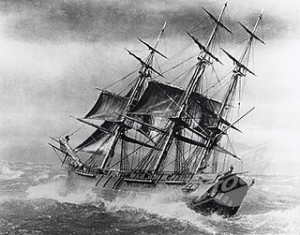
(35) American Revolution (1776) – The American revolution greatly affected the church, both negatively and positively. Negatively, John Wesley and other English preachers spoke out against the rebellion of the colonists and called for Christians to refuse to join the rebellion. The Pope spoke out democracy and as late as 1864 the Pope condemned the democratic form of government practiced in the United States (Syllabus of Errors). Many of the churches were founded in terms of a national church within a single nation ended up creating uniquely American churches. The Presbyterian Church of the USA, The Protestant Episcopal Church (Anglican), American Methodists (after 1776, the British Methodist Pastors all left for England) were all created shortly after the revolution began. In the midst of the separations, the Unitarian church was founded by those with more rational and deistic beliefs. For better or worse the America churches were now on their own.
